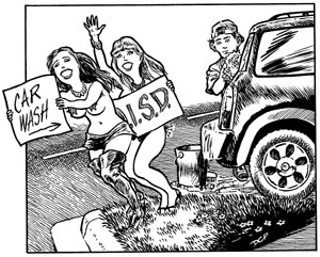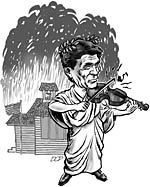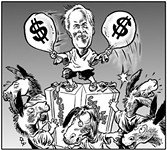Tits for Tots
The governor's school finance plan opens at the Bada Bing
By Michael King, Fri., April 16, 2004

You've got to hand it to Gov. Rick Perry – he's doing his damnedest to keep the editorial cartoonists employed. Two months ago in this space I asked, "What's next from the Perry Education Excellence Brain Trust? We hear there's real money to be made in Internet porn." I thought that was a little over the top, even a cheap shot, and considered cutting it. Turns out I was just ahead of my time: Last week the governor proposed a $5 minimum "adult entertainment tax," whereby patrons of topless bars would be enjoined to underwrite the education of Texas schoolchildren. Many municipalities currently waste buckets of public time and money in futile attempts to keep "adult entertainment" venues out of sight of schools and churches. Perhaps now the PTA, the school board, and the liquor lobby can happily join hands for "Back to School Nights" down at the Yellow Rose.
Tuesday morning, Perry called a special session on school finance, to begin April 20. Keep your eyes peeled for a new dress code for reading clerks.
The topless tax is not the only element of the governor's "Educational Excellence & Property Tax Relief" plan unveiled last week, but it's of a piece with the other revenue-raising aspects, which rely heavily on that and other "sin taxes" like higher levies on smoking and gambling. (One might think the Lord would frown on using vices to fulfill the community's shared obligation of child raising, but I try to leave theology to the professionals.) The same legislators who put the Indian casinos out of business will be asked to expand the lottery to reservations and racetracks and to boost cigarette taxes (while health and human services go begging). The plan also calls for closing the corporate franchise tax loophole, a necessary step defeated last year, as well as reducing sales-tax fraud and improving collection of delinquent taxes – the latter both admirable ambitions, but it shouldn't take an education initiative to enforce the law.
Hold Your Applause
To his credit, the governor has at least stuck his neck out and proposed a plan. That's more than can be said for the Joint Committee on Public School Finance, which could not even agree on a final report that did little more than list the usual options. Lukewarm responses from both Lt. Gov. David Dewhurst and Speaker Tom Craddick suggest that the legislative consensus Perry says he is waiting for has still not materialized, and that releasing the plan is partly an attempt to get things moving. On the political side, it doesn't look much better – all the state teachers groups say they oppose a special session that won't dedicate significant new revenues to education, and the business groups are balking at Perry's proposal to centralize business property taxes.
But there was movement over the weekend from the Texas Association of School Boards and the Texas Association of School Administrators, who like Perry's promise to maintain last year's $150-per-student boost – although that money was lifted directly from school employee health insurance, unmentioned in Perry's plan – and his pledge of "new money" over and above his performance incentive initiative, although the amounts involved do not appear to address the system's real and growing needs. According to state estimates, population growth alone adds 60,000 to 70,000 students a year, or $1.2 billion in expenses – enough to devour all of the governor's promised increase in per student funds, less token amounts for bilingual education and "equalized enrichment" (aka alms for the poor). That leaves the performance incentives (which in theory must be matched by districts) as Perry's contribution to public education – instead of fair compensation and reasonable benefits, teachers can sign on to win the bonus lottery.
If this sounds like a secondhand school finance system, that's probably because even in the governor's rollout, education funding was entirely secondary to tax cuts – although voters have repeatedly demonstrated their willingness to support public schools. Despite a sound rejection by the Lege last spring and howls from local officials expected to carry increasing community burdens with less state revenues, Perry insists he can both lower property taxes and cap appraisal increases (at a laughable 3% per year) and still deliver additional dollars to public schools.
That's a whole lot of lap dances.
Taxpayer Protection
Announcing his plan, Perry declared, "I will further protect Texans by opposing a personal income tax in any shape or form – to the disappointment of those who are calling for one." Those phantom rationalists would include state Sen. Eliot Shapleigh, who has been shopping an income-tax plan around the state to enthusiastic response, as well as Austin state Rep. Eddie Rodriguez, who filed an income-tax bill last year and has now launched a Web site –
www.texastaxrelief.com
– that allows taxpayers to calculate what they now pay in property taxes vs. what they would pay under a state income tax that would cut property taxes proportionately and be deductible against federal taxes (an option not heretofore available for topless bar receipts, but maybe I'm out of touch). Either plan would result in more revenue for education while lowering taxes for the large majority of taxpayers.
What a concept: better schools and lower taxes that yet respond to growth in population and income. Could it be that the Texans the governor actually wants to "protect" from income taxes is the wealthy minority?
The politicians rely on the received wisdom, reiterated in the Joint Select Committee's report, that "most Texans abhor a personal state income tax." In fact, most Texans do nothing of the kind. A statewide poll taken last May, in the middle of a contentious Lege session and during an economic downturn, indicated that 52% of Texans would support an income tax if property taxes were reduced and the revenue would go to education (as required by the Constitution). A more recent poll indicated that something like 75% of Texans support more funding for public schools. Just think what those numbers might be if there were a little more real leadership down at the Capitol.
On the other hand, we could just ask the Sugar's dancers to help out at the junior high car washes, tips encouraged. Certainly would be an education. ![]()
Got something to say on the subject? Send a letter to the editor.










